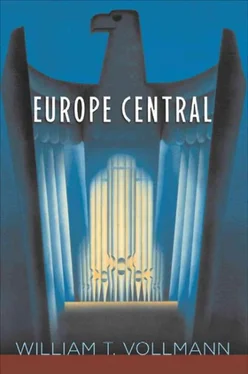682 Lebedinsky to Shostakovich: “You don’t have much luck with women, Dmitri Dmitriyevich. Or maybe it’s more accurate to say that you’ve racked up your share of failures” —Somewhat after Wilson, p. 352 (testimony of Lebedinsky).
682 Shostakovich to Irina Supinskaya: “Actually, I’m not against your calling the Seventh the Leningrad Symphony…”—Closely after Shostakovich and Volkov, p. 156.
683 Shostakovich to Lebedinsky: “I’d sign anything even if they shoved it at me upside down”—Wilson, p. 183 (actually not said to Lebedinsky but remembered by Y. P. Lyubimov, slightly altered).
683 Khrushchev: “Plainly speaking, why do the United States of America…”—N. H. Mager and Jacques Katel, comp. and ed., Conquest Without War: An Analytical Anthology of the Speeches, Interviews, and Remarks of Nikita Sergevich Khrushchev, with Commentary by Lenin, Stalin and Others (New York: Pocket Books, 1961), p. 99 (at Czechoslovakian embassy, Moscow, quoted in New York Times 10 May 1960).
685 Shostakovich on the beauty and plumpness of Meyerhold’s wife—Loosely after Shostakovich and Volkov, p. 78.
686 Marina Tsvetaeva : “I set my lips to the breast of the great round battling earth.”—Tsvetaeva, p. 20 (from “Insomnia,” 1916, stanza 6), “retranslated” by WTV.
687 Dostoyevsky: “Why do even the finest people…?”— Uncle’s Dream etc., p. 109 (“White Nights”).
690 Shostakovich to Glikman: “I’m not going, you see… They’ll have to tie me up” —Slighly altered from Glikman, p. 92 (Glikman’s commentary).
691 German casualties of the Allied bombing of Dresden—Kershaw (p. 761) gives an estimate of “at least 35,000” victims.
692 “Even former S.S. officers were cooperating with us now…”—Gehlen (p. 249) names three who worked for East German intelligence in part “to avenge the Allied bombing of Dresden in 1945.”
693 Shostakovich: “The distinguishing feature of Jewish music…”—Wilson, p. 235 (testimony of Rafiil Matveivich Khozak).
694 Shostakovich to Glikman: “I wrote an ideologically deficient quartet…”—Slightly altered from Fay, p. 217.
695 “Akhmatova insists… that whoever doesn’t make continual reference to the torture chambers all around us is a criminal”—Loosely after Chukovskaya (p. 5), who was actually writing that she herself would be a criminal if she didn’t make at least some elliptical record of her conversations with the great poet.
696 Manfred Smolka: “There is no doubt that desertion and treachery…”—Richard J. Evans, Rituals of Retribution: Capital Punishment in Germany 1600-1987 (New York: Oxford University Press, 1996), p. 852. From the context, it is not clear whether Smolka’s words were in fact reported in the press.
697 The Kabbalists: “Every definition of God leads to heresy”—Matt, p. 32 (Abraham Isaac Kook, “Pangs of Cleansing,” in Orot ).
697 Shostakovich: “When fate and all that is, you know, meaningless!”—Loosely after Shostakovich and Volkov, p. 17.
701 Conventional wisdom on Zoya: “Not long but beautifully did she live!”—Vsesoyuznuii Gospudarstvennui Fond Kinofilmov, p. 331 (entry on the movie “Zoya,” trans. WTV).
703 Leskov on Katerina’s final murder: She “threw herself on Sonetka like a strong pike on a soft little perch”—Nikolai Leskov, The Enchanted Wanderer: Selected Tales, trans. David Magarshak (London: Andre Deutsch Ltd., 1987, repr. of 1961 Secker & Warburg ed.), p. 50 (“Lady Macbeth of the Mtensk district,” 1865).
704 Shostakovich to F. P. Litvinova: “You know, my dear Flora Pavlovna, I would have displayed more brilliance…”—Fay, p. 268.
706 Description of Nina’s portrait—After the illustration in Gojowy, p. 28 (“Die Ehefrau Dimitri Schostakowitschs, Nina Wassiljewna geb. Warsar”).
707 “Seed corn must not be ground.”—Title of an image by Käthe Kollwitz, 1941-42.
708 The district Party secretary: “This is outrageous! We let Shostakovich join the Party…”—Wilson, p. 359 (Kirill Kondrashin).
708 Tale of Ashkenazi as Shostakovich’s divorce intermediary against Nina—Based on Khentova, p. 130, trans. for WTV by Sergi Mineyev.
708 Date of Roman Karmen’s marriage to Maya Ovchinnikova, his telephone number and his preference for hunting and fast cars— The International Who’s Who, 1977-78 (London: Europa Publications Ltd., 1977), entry on Karmen. The original says “cars,” not “fast cars.” But in Karmen’s “Far and Wide My Country Stretches” there are a huge number of sequences with fast cars in them.
709 Karmen’s private telephone number, ca. 1965—Andrew I. Lebed, Dr. Heinrich E. Schulz and Dr. Stephen S. Taylor, Who’s Who in the USSR 1965-66, 2nd ed. (New York: Scarecrow Press, 1966; printed in Spain; orig. comp. by Institute for the Study of the USSR, Munich), p. 346 entry on Karmen, whose address was then Polyanka 34. The International Who’s Who gives him a different number in 1977-78, so it seemed no invasion to publish this one.
711 Shostakovich to his wife: “It was blackmail, Irinochka… If you love me, you won’t dig that up…”—Loosely after Fay, p. 218.
712 Shostakovich to his wife: “You see, I’m such an insensitive criminal type…”—Loosely after Shostakovich and Volkov, p. 242 (actually said in reference to the criticisms not of Denisov but of Solzhenitsyn).
712 “A great comrade”: “Anyone in this world who does not succeed in being hated…” —Hitler, p. 363.
713 The ditty played by Shostakovich: “Merry singing makes the heart glow…”—Von Geldern and Stites, p. 234 (Vasily Lebedev-Kumach and Isaac Dunaevsky, “March of the Happy-Go-Lucky Guys,” 1934), “retranslated” from the following, which rhymes A B C C in the facing Russian text: “Merry singing fills the heart with joy. / It will never let you be sad. / The countryside and villages love singing, / And big cities love singing, too.”
713 Brezhnev: “Socialist art is profoundly optimistic and life-affirming”—Daniels, p. 282 (Report of the CPSU Central Committee to the 23rd Congress of the Communist Party of the Soviet Union, 29 March 1966).
714 The reunion of Shostakovich and Akhmatova (“eighty-eight”)—After Shostakovich and Volkov, pp. 274-75. So far as I know, their meeting was not filmed and Roman Karmen was not present.
717 The bourgeois critic Layton: “At their best, the symphonies…”—Simpson, op. cit., p. 198.
717 Shostakovich to Glikman: “I am a dull, mediocre composer”—Glikman, p. 140 (letter of 3 February 1967, abridged).
718 Shostakovich to Glikman: “Slowly and with great difficulty…”—Glikman, p. 143 (letter of 8 April 1967).
719 Shostakovich to the orchestra: “On the left and right flanks, the battalion regions are echeloned…”—After Glantz and House, p. 277 (Stavka Front Directive No. 12248, 8 May 1943, 0429 hours).
719 Shostakovich to the audience: “Death is terrifying…”—Wilson, p. 417 (Mark Lubot-sky, unpublished memoir).
719 Shostakovich to his wife: “Unfortunately, Lebedinsky has grown, how shall I put it, old and stupid”—Wilson, p. 352, Shostakovich-ized.
719 Von Manstein: “Consequently it was now necessary for the Germans…”—Op. cit., p. 470.
722 “Our unshakable allies in East Germany” on the Fifteenth: “Strangely reserved and introverted” —Otto-Jürgen Burba, “Repetitio und Memento: Struktur und Bedeutung der Ostinatoformen bei Dmitri Schostakowitsch,” in Schweizer Musikpädagogische Blätter (Switzerland), vol. 85, issue 1 (January 1997), pp. 25-30; trans. for WTV by Yolande Korb; “retrans.” here and there by WTV; original p. 28; Korb, unnumbered p. 5.
Читать дальше












